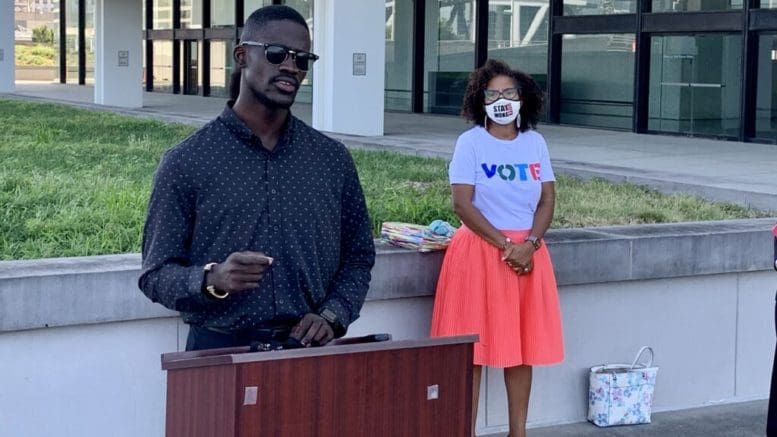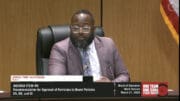by Stanley Dunlap, Georgia Recorder [This article first appeared in the Georgia Recorder, republished with permission]
June 28, 2022
Georgia Power’s plan to saddle its customers with a 12% electricity rate hike over the next three years will be decided by a Public Service Commission that’s the focus of a federal trial this week that claims Black residents suffer disproportionately from higher utility bills and are disenfranchised by the state regulator’s candidacy rules.
On Monday, lawyers delivered opening statements and the first witnesses took the stand in an Atlanta U.S. District courtroom as the Rose vs. Secretary of State Brad Raffensperger lawsuit got its first hearing. Four Black Fulton and DeKalb county residents allege that the voting strength of Black people is eroded by a statewide election process used to elect the Public Service Commission.
Attorneys for the plaintiffs Monday laid out plans to prove that the state’s systemic racial dilution violates Section 2 of the Voting Rights Act of 1965. Black Georgians represent more than 30% of the voting age population, yet have not had a candidate they overwhelmingly support elected in the last decade and that only one Black commissioner has been elected since the PSC was established in 1879.
Former NAACP state President James Woodall, a party to the suit, testified that the pandemic exacerbated the financial struggles of many Black residents as they struggled to pay higher electric bills.
Now, the state’s largest utility provider is asking for the commission to approve a $1 billion rate hike that, starting in 2023, would add another $14.32 on the monthly bill of the typical residential customer.
Advocates’ calls for state regulators to better address the racial inequity of Black households paying a significantly higher percentage of their income on utilities have fallen on deaf ears, said Woodall, a lobbyist for the Southern Center for Human Rights.
In 2020, the commission allowed a Georgia Power moratorium on cutting off power to expire as a scorching summer rolled on, witnesses said.
Woodall said district-level elections similar to the ones drawn for Congress and the state Legislature would allow a majority Black district to elect a commissioner attuned to their community’s needs.
“Having a difference in experience and culture and understanding of communities, it changes the way deliberations are had,” he said.
In December, the current commission is scheduled to vote on a plan that would increase the average bill by $16.29 a month by 2025, a hike Georgia Power said will cover inflation-related costs, improve its infrastructure, close some coal-fired plants and expand solar, wind, and hydro capacity. The state’s largest electricity provider says it will also allow the company to invest $700 million in customer service and electric vehicle technology.
But Liz Coyle, the executive director of consumer watchdog Georgia Watch, said when asked to comment on the case that such a steep increase will make it tougher on many Georgians. In 2019, the PSC approved a $1.7 billion rate hike for Georgia Power.
“Georgians already face one of the highest energy burdens in the country, especially in communities of color,” Coyle said. “If the Georgia Public Service Commission approves this steep rate hike, electric bills will be even more unaffordable, forcing people to cut back on other household necessities like food just to keep the lights on.”
Public service lawsuit not run-of-the-mill
Following the week-long trial, U.S. District Court Judge Steven Grimberg will decide if only voters within a PSC district can vote on a specific candidate who lives within that boundary.
Under the GOP redistricting, the majority Black PSC districts is comprised of Fulton, DeKalb and Clayton counties.
Attorneys claiming disenfranchisement said Monday that federal law does not require proof that the rules were adopted with the intent to discriminate, but whether they led to racial bias.
The state’s attorney Bryan Tyson said that the case is much more than a straight forward legal matter and is instead relying on a very novel concept of whether statewide election system is inherently discriminatory.
Experts for the state are expected to testify that socioeconomic factors such as household income are more significant factors in how utility costs and other kitchen table spending decisions are made than race, Tyson said.
The election results from 2020, in which Democratic candidates overwhelmingly backed by Black voters, won Georgia’s U.S. Senate and presidential races, show that Black participants have as much opportunity to participate in politics as other groups, Tyson said.
“Political partisanship better explains the pattern of voting dilution in Georgia than race does,” he said.
Georgia’s long history of racial discrimination in elections continues today, Woodall said, noting that a 2020 voting law overhaul added more barriers to absentee voting.
Although President Joe Biden and U.S. Sens. Raphael Warnock and Jon Ossoff won the state runoff in 2021, PSC candidate Daniel Blackman lost even though he was supported by the majority of Black voters even though he shared a spot on the runoff ballot with Ossoff and Warnock.
“Historically speaking unless there are very special circumstances it is highly improbable for a Black preferred candidate to win,” Woodall said.
Last year, Gov. Brian Kemp appointed the second ever Black member, Cobb County Republican Fitz Johnson, to fill the remainder of the term of Chuck Eaton after the governor tapped the commissioner to become a superior court judge.
Attorney Wesley Morrissette said their case would demonstrate that PSC commissioners Tricia Pridemore and Tim Echols to redraw the district maps to carve out the Republican Echols’ Democratic opponent Patty Durand from a suburban Atlanta district for the Nov. 8 election. Echols also successfully lobbied for his new district to include Tybee Island, where he is planning to move.
Durand is challenging her residency requirement in federal court in order to remain on the Nov. 8 ballot.
The four people challenging the PSC district election system are affiliated with civil and environmental rights organizations, but are not officially representing their organizations in the case.
The group also includes Atlanta NAACP President Richard Rose; Wanda Mosely, the national field director of the Black Voters Matter Fund; and Brionté McCorkle, executive director of Georgia Conservation Voters.
Georgia Recorder is part of States Newsroom, a network of news bureaus supported by grants and a coalition of donors as a 501c(3) public charity. Georgia Recorder maintains editorial independence. Contact Editor John McCosh for questions: info@georgiarecorder.com. Follow Georgia Recorder on Facebook and Twitter.




